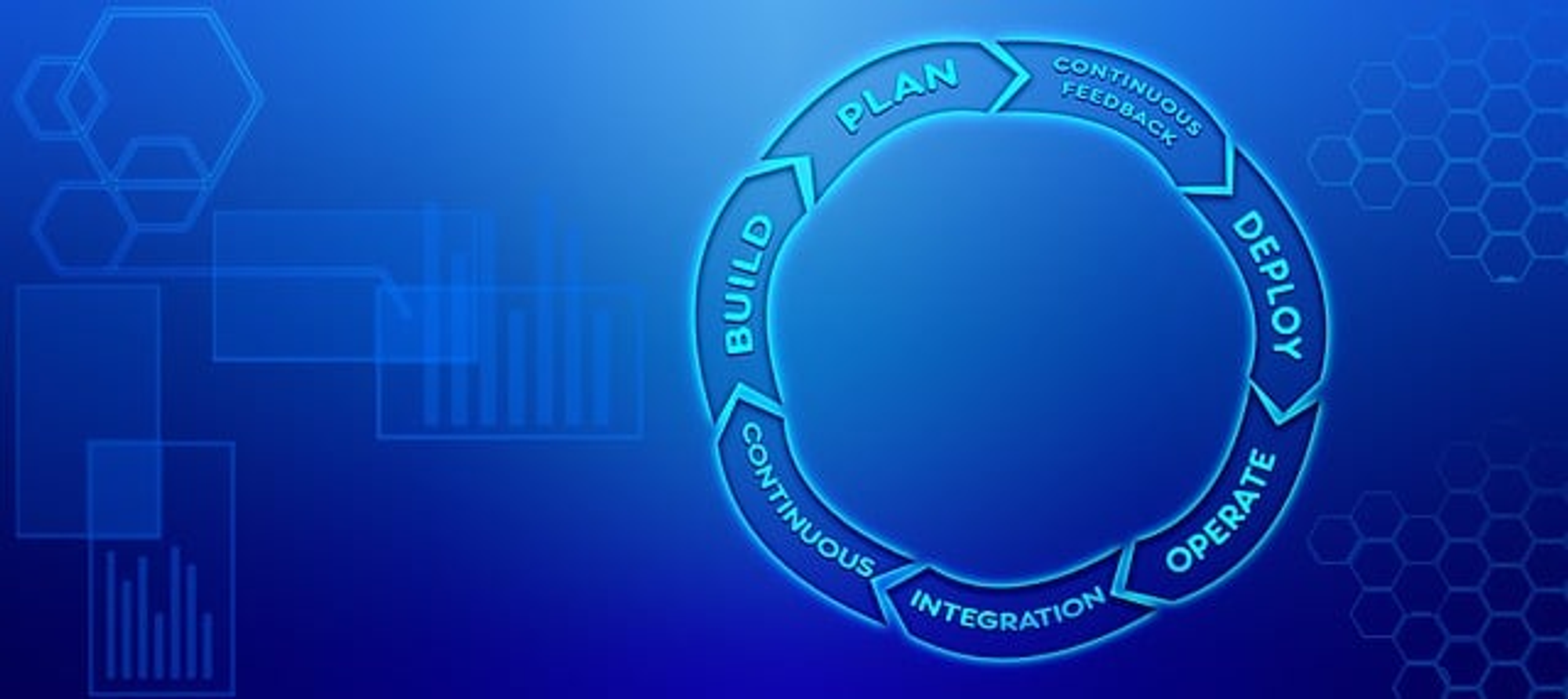DevSecOps vs. DevOps: Enhancing Security in Agile Frameworks

DevOps, a collaboration between software development (Dev) and IT operations (Ops), has become an effective approach to accelerate software development and delivery. Recently, however, a new trend has emerged that puts security at the forefront: DevSecOps. This approach integrates security measures directly into the development process to ensure that security considerations are part of the software lifecycle from the beginning. DevOps and DevSecOps mainly differ in the integration of security practices. While DevOps primarily focuses on efficiency and collaboration between development and IT teams, DevSecOps places a greater emphasis on integrating security practices throughout the software development lifecycle, treating security as a primary concern. In this article, we explore the differences and similarities between DevOps and DevSecOps, highlight the importance of understanding the nuances between the two concepts for efficient, scalable, and secure delivery pipelines, and address the challenges within DevOps environments as well as the implementation and benefits of DevSecOps.
Understanding DevOps in Software Development
DevOps, as a strategic approach, is a cultural and technical movement aimed at integrating development and operations through improved communication, collaboration, and automation. DevOps teams play a crucial role in the successful implementation of these practices. The core principles of DevOps include continuous integration, continuous delivery, and continuous feedback, which are designed to accelerate the software development process and enhance collaboration among various stakeholders.
Definition and Core Principles
DevOps unites development and operations teams to improve the entire software lifecycle from planning to development, testing, deployment, and operations. The core elements of DevOps are automation, continuous delivery, and rapid feedback.
Key Components of the DevOps Methodology:
Continuous Integration (CI): Automates the process of uploading code to a repository, followed by automated builds and tests.
Continuous Delivery (CD): Ensures that software can be tested, verified, and released in a production-ready environment.
Monitoring and Feedback: Tools and practices that enable real-time monitoring of application performance and quick response to issues.
Benefits of Adopting DevOps
Adopting DevOps in an organization can significantly reduce the time to market for new products and features. By minimizing silo mentality and promoting open communication and collaboration between teams, errors are discovered and fixed more quickly, improving operational stability. DevOps also fosters a culture of continuous improvement, leading to more innovative and creative work environments.
Introduction to DevSecOps

DevSecOps, an extension of the DevOps model by integrating security, emphasizes the importance of incorporating security measures into the entire software development process from the outset. This approach, often referred to as 'devsecops devops,' highlights the necessity of viewing security not as an afterthought but as an integral part of development.
Definition and Core Principles
DevSecOps stands for Development, Security, and Operations. It is about considering security as an equal part of the development and operations process. The basic idea is that security is not treated in isolation or at the end of the development chain but is a continuous priority throughout the entire development process.
Integration of Security into DevOps
Early Integration: Security considerations are included from the planning phase.
Automation of Security Testing and Securing: Security tests and the securing of DevOps pipelines are automated and integrated into daily development processes.
Continuous Assessment: Security risks are continuously assessed, not just during major releases.
Importance of Security in Agile Environments
In agile environments, where rapid iterations and frequent updates are the norm, retrofitting security can lead to delays and potential risks. Securing the DevOps environment is crucial to preventing risks in the agile development process. DevSecOps aims to minimize this risk by early and continuous integration of security measures. The challenges and benefits of integrating security practices into various DevOps environments highlight the need to prioritize security throughout the development pipeline.
Key Differences Between DevSecOps and DevOps

The key difference between DevSecOps and DevOps lies in how security considerations are integrated into the development process. While DevOps primarily focuses on improving collaboration, automation, and faster delivery, DevSecOps adds an additional layer of security considerations by integrating security checks throughout the development cycle, unlike DevOps, which typically addresses security towards the end of the process.
Integration of Security Measures:
DevOps: Security is often an afterthought.
DevSecOps: Security is an integral part from the beginning, supported by automated tools and processes.
Role of Automation in Security:
DevOps: Automation focuses on delivery and operations.
DevSecOps: Automation also includes continuous security monitoring and testing.
Impact on the Software Development Cycle:
DevOps: Speed and efficiency are the focus.
DevSecOps: Security is treated equally alongside speed and efficiency.
Advantages of DevSecOps Over DevOps

DevSecOps offers a range of benefits, making it not just an extension of DevOps but an essential component in developing secure software.
Increased Security from the Start: By integrating security considerations from the beginning of the development process, DevSecOps helps to identify and fix vulnerabilities early. This reduces the risk of security breaches in the final software and ensures that security is embedded in every step of software development.
Improved Compliance and Risk Management: In many industries, companies are legally required to adhere to strict data security and privacy standards. DevSecOps automates many of the compliance processes and integrates them into daily operations, simplifying compliance and minimizing the risk of violations.
Wide Industry Applications:
Healthcare: DevSecOps allows healthcare providers to ensure patient data is continuously protected from collection to storage and analysis.
Financial Services: Banks and financial institutions use DevSecOps to ensure security in transaction processing while meeting strict regulatory requirements.
Public Sector: Government agencies apply DevSecOps to improve the security of critical infrastructures while promoting agile development practices.
Challenges in Integrating DevSecOps
Despite its advantages, integrating DevSecOps into existing systems presents certain challenges that must be addressed to reap the full benefits.
Cultural Shifts Within Teams: Implementing DevSecOps often requires a cultural change within the organization. Teams must recognize the value of security and be willing to change their way of working to include security considerations from the beginning. It is crucial for operations teams to undergo a cultural shift to view security as a shared responsibility and integrate it accordingly.
Increased Complexity in Implementation: DevSecOps introduces additional security tools and processes into the development cycle, increasing complexity. Teams need to learn how to work with these new tools while maintaining efficiency.
Required Skills and Training for Teams: To successfully implement DevSecOps, teams need specific training in security techniques and practices. This can be a challenge, especially in smaller teams or startups with limited resources.
Conclusion
DevSecOps and DevOps represent modern approaches in software development aimed at enhancing efficiency and quality. While DevOps has already brought significant improvements in the agility and speed of software delivery, DevSecOps expands this framework with an essential component: security.
Summary of Differences and Integration: DevSecOps is not just an extension of DevOps but a necessary evolution to meet security requirements in rapid development cycles. Integrating security measures from the start helps to proactively address vulnerabilities, thereby improving the overall security of developed solutions.
Looking to the Future: In an increasingly digital world where security threats are constantly growing, the role of DevSecOps will continue to gain importance. Companies that successfully implement DevSecOps are better equipped to protect themselves against security risks while also leveraging the benefits of agile development practices.
Recommendations for Companies: Companies considering implementing DevSecOps should not underestimate the necessary cultural change and should invest in appropriate training and tools to support the transformation. The choice of the right approach should be based on the specific requirements and existing infrastructure of the company.
FAQs
What are the primary tools used in DevSecOps?
In DevSecOps, various tools are used for security management, automated security testing, and continuous monitoring. Common tools include Jenkins for CI/CD, SonarQube for code quality and security checks, and Docker for container security.
How does DevSecOps impact the speed of delivery?
Although integrating security measures into the development process may initially require additional time, early detection and resolution of security issues lead to faster and more secure delivery in the long run.
Is DevSecOps suitable for all types of organizations?
DevSecOps is suitable for any organization that develops software, especially where security is a critical element. The scalability and flexibility of DevSecOps make it suitable for both small startups and large enterprises.

We light the path through the tech maze and provide production-grade solutions. Embark on a journey that's not just seamless, but revolutionary. Navigate with us; lead with clarity.
Connect with an Expert
Salih Kayiplar | Founder & CEO


Containerization & Microservices
Containerization & Orchestration ConsultingApplication Modernization ConsultingKubernetes ConsultingDocker ConsultingCI/CD & GitOps
CI/CD ConsultingGitOps ConsultingArgoCD ConsultingFluxCD ConsultingJenkins ConsultingFlagger ConsultingSecurity & Compliance
DevSecOps ConsultingHashiCorp Vault ConsultingSonarQube ConsultingSnyk ConsultingKyverno ConsultingOpen Policy Agent ConsultingNetworking
Cloud Native Networking ConsultingAccess & Identity Management
HashiCorp Boundary ConsultingKeycloak ConsultingHashiCorp Vault ConsultingContainer Registry & Dependencies
Registry & Package Management ConsultingSoftware Dependency ConsultingHarbor ConsultingDragonFly ConsultingJFrog ConsultingRenovate ConsultingTesting & Chaos Engineering
Testing & Chaos Engineering ConsultingChaos Mesh ConsultingTerratest ConsultingLitmus ConsultingObservability & Analysis
Prometheus ConsultingThanos ConsultingOpen Telemetry ConsultingJaeger ConsultingStreaming & Messaging
NATS ConsultingCloud Infrastructure Deployment
Cloud Infrastructure ConsultingCloud Infrastructure Deployment ConsultingTerraform ConsultingPulumi ConsultingCrossplane ConsultingTerragrunt ConsultingCloud Migration
Cloud Migration ConsultingDisaster Recovery
Disaster Recovery ConsultingCloud Maintenance
Cloud Maintenance ConsultingContainerization & Microservices
Containerization & Orchestration ConsultingApplication Modernization ConsultingKubernetes ConsultingDocker ConsultingCI/CD & GitOps
CI/CD ConsultingGitOps ConsultingArgoCD ConsultingFluxCD ConsultingJenkins ConsultingFlagger ConsultingObservability
Observability ConsultingGrafana ConsultingGrafana Loki ConsultingGrafana Tempo ConsultingGrafana Mimir ConsultingOpenTelemetry ConsultingJaeger ConsultingThanos ConsultingPrometheus ConsultingSecurity & Compliance
DevSecOps ConsultingHashiCorp Vault ConsultingSonarQube ConsultingSnyk ConsultingKyverno ConsultingOpen Policy Agent ConsultingNetworking
Cloud Native Networking ConsultingAccess & Identity Management
HashiCorp Boundary ConsultingKeycloak ConsultingHashiCorp Vault ConsultingContainer Registry & Dependencies
Registry & Package Management ConsultingSoftware Dependency ConsultingHarbor ConsultingDragonFly ConsultingJFrog ConsultingRenovate ConsultingTesting & Chaos Engineering
Testing & Chaos Engineering ConsultingChaos Mesh ConsultingTerratest ConsultingLitmus ConsultingService Mesh & Loadbalancer
Load Balancer ConsultingService Mesh ConsultingIngress Controller ConsultingLinkerD ConsultingIstio ConsultingHashicorp Consul ConsultingKong ConsultingObservability & Analysis
Prometheus ConsultingThanos ConsultingOpen Telemetry ConsultingJaeger ConsultingStreaming & Messaging
NATS ConsultingCloud Infrastructure Deployment
Cloud Infrastructure ConsultingCloud Infrastructure Deployment ConsultingTerraform ConsultingPulumi ConsultingCrossplane ConsultingTerragrunt ConsultingCloud Migration
Cloud Migration ConsultingDisaster Recovery
Disaster Recovery ConsultingCloud Maintenance
Cloud Maintenance ConsultingContainerization & Microservices
Containerization & Orchestration ConsultingApplication Modernization ConsultingKubernetes ConsultingDocker ConsultingCI/CD & GitOps
CI/CD ConsultingGitOps ConsultingArgoCD ConsultingFluxCD ConsultingJenkins ConsultingFlagger ConsultingObservability
Observability ConsultingGrafana ConsultingGrafana Loki ConsultingGrafana Tempo ConsultingGrafana Mimir ConsultingOpenTelemetry ConsultingJaeger ConsultingThanos ConsultingPrometheus ConsultingSecurity & Compliance
DevSecOps ConsultingHashiCorp Vault ConsultingSonarQube ConsultingSnyk ConsultingKyverno ConsultingOpen Policy Agent ConsultingNetworking
Cloud Native Networking ConsultingAccess & Identity Management
HashiCorp Boundary ConsultingKeycloak ConsultingHashiCorp Vault ConsultingContainer Registry & Dependencies
Registry & Package Management ConsultingSoftware Dependency ConsultingHarbor ConsultingDragonFly ConsultingJFrog ConsultingRenovate ConsultingTesting & Chaos Engineering
Testing & Chaos Engineering ConsultingChaos Mesh ConsultingTerratest ConsultingLitmus ConsultingService Mesh & Loadbalancer
Load Balancer ConsultingService Mesh ConsultingIngress Controller ConsultingLinkerD ConsultingIstio ConsultingHashicorp Consul ConsultingKong ConsultingObservability & Analysis
Prometheus ConsultingThanos ConsultingOpen Telemetry ConsultingJaeger ConsultingStreaming & Messaging
NATS ConsultingCloud Infrastructure Deployment
Cloud Infrastructure ConsultingCloud Infrastructure Deployment ConsultingTerraform ConsultingPulumi ConsultingCrossplane ConsultingTerragrunt ConsultingCloud Migration
Cloud Migration ConsultingDisaster Recovery
Disaster Recovery ConsultingCloud Maintenance
Cloud Maintenance Consulting© 2025 CloudCops - Pioneers Of Tomorrow